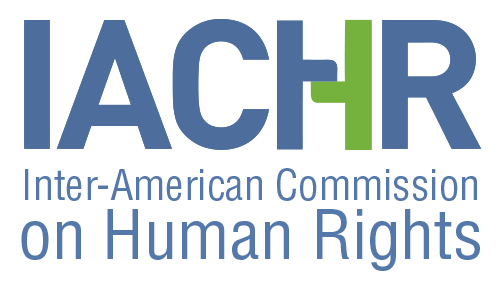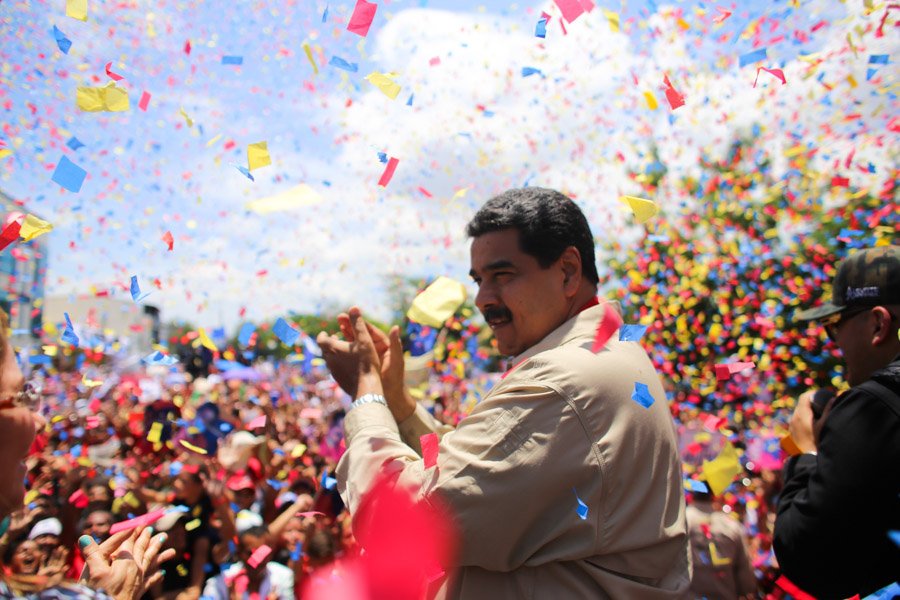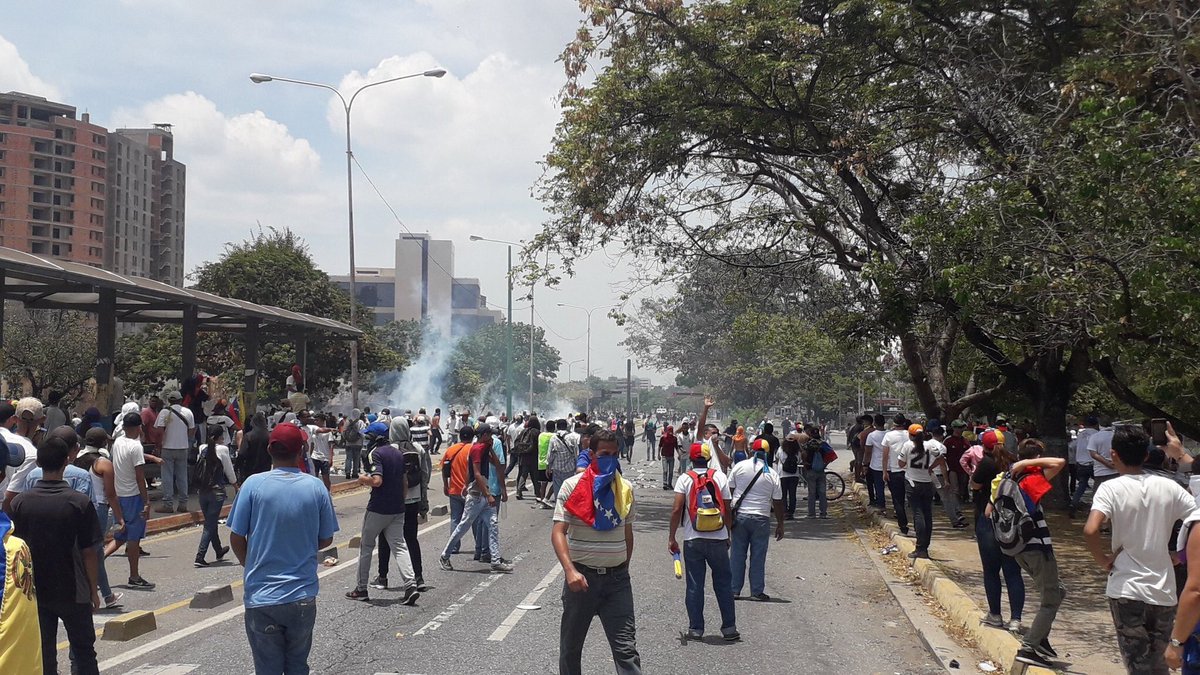The fifth edition of the “tweet-o-meter” of the Instituto Prensa y Sociedad Venezuela-IPYS (Press and society institute Venezuela) analyzed traits of hate speech from the profile of four political actors with a prominent influence in both the ruling party and the opposition. Political groups supporting both Nicolás Maduro and Juan Guaidó maintained an inflammatory jargon in the first four months of 2019. Their agenda on Twitter was built with messages that encouraged confrontation, intolerance. Both sides of the political spectrum used hate-promoting accusations with no evidence, endangering freedom of expression.
Terrorism, usurper, criminals, attack, war, violence, fear, hate, struggle, traitors, coup. This was part of the narrative repertoire that a group of senior Venezuelan political leaders resorted to, including Nicolás Maduro and Juan Guaidó, seeking to maintain an atmosphere of intolerance and confrontation in the hectic public agenda of Twitter in Venezuela, during the first five months of 2019.
With these words they built a battleground dominated by an incendiary verb, to impact the social network environment between January 10th and May 10th, four months marked by two simultaneous presidential mandates in Venezuela.
The rationale of the political conflict, the power blackouts, and the discussions on the humanitarian aid determined the conversation of the ruling party and the opposition on Twitter with inflammatory narratives, a term defined by UNESCO as the communication practices that propagate disturbing content and amplify the discourses of hate. This body warns about this phenomenon given the fact that they are actions that result in violent rhetoric, dangerous for public deliberation, that aims at causing violent outcomes, intolerance, or discrimination, which affects peaceful coexistence and understanding in societies.
Catalysts of violence
Unesco has stated that “hate speech as a concept has also been questioned for being too broad and open to manipulation, and progress has been made in more limited conceptions, including ‘dangerous speech’ and ‘fear speech’, to focus on in the ability of speech to cause harm and lead to violent outcomes. Although hate speech is found, in some way, in almost every society, including those in which the risk of violence is limited, the concept of dangerous speech aims to isolate acts that have a significant probability of ́catalyzing or amplifying violence by one group against another.”
The framework of this organization also indicates that the assessment is determined by various variables “i) the personal traits and the popularity of the speaker; ii) the emotional state of the audience; iii) the content of the speech acts as a call to action; iv) the historical and social context in which the action takes place, and v) the means used to disseminate it.
Based on these criteria, IPYS Venezuela undertook a new reading of the “tweet-o-meter”. It covered the period between January 10th and May 10th, 2019, and it studied the messages of intolerance or political discrimination, and those framed in a violent speech, based on dangerous and inflammatory expressions which according to UNESCO are part of the broad hate speech phenomenon.
On this occasion, the IPYSVe “tweet-o-meter” marker captured a sample throughout 121 days, during times of high political conflict in the country. The study revealed that, in the first four months of the year, 261 messages with contents of intolerance and a violent verb were launched on Twitter, by Nicolás Maduro, Juan Guaidó and six other political actors and public officials, who were at the moment part of their supporting teams to determine the public agenda.
In this repertoire of violent messages, contents posted by leaders of the National Assembly, Edgardo Zambrano, Stalin González, and the opposition leader María Corina Machado was also found. On behalf of the ruling party, Diosdado Cabello, Delcy Rodríguez and Jorge Rodríguez joined the same trend. This is a sample but reflects part of the representation of the political leadership in the country throughout 2019.
Their Twitter profiles allowed for the analysis of the construction of violent rhetoric, which is a point of discussion and concern in the global agenda on freedom of expression. The United Nations Special Rapporteurship for Freedom of Expression emphasizes that “public officials have a special responsibility” to reject and not amplify “hate speech.”
In its analysis of hate speech, UNESCO has considered that “Twitter conversations organized around trending topics can facilitate the rapid and wide dissemination of hate messages, but also offer the opportunity for influential speakers to avoid the messages and possibly cut the popular threads that incite violence.”
Amplifiers of the inflammatory verb
The recent United Nations Strategy and Plan of Action on hate speech, published in June 2019, established that “public discourse is becoming a weapon to reap political gains with incendiary rhetoric that stigmatizes and dehumanizes minorities ”and“ all those labeled as “the others”. The UN also warned that “hatred is becoming widespread, both in liberal democracies and in authoritarian systems, and with each broken rule, the pillars of our common humanity are weakened.”
Venezuela is no exception. From the four Twitter profiles of spokespersons of the ruling party analyzed in this investigation, an artillery of 164 tweets with dangerous contents was prepared. Most of these messages, between January and May, were cast to reject the political conflict and the actions undertaken by the National Assembly that called for the “Ceasing of the usurpation, a transitional government, and free elections”, as well as the alleged intervention of the United States government in the sovereignty of Venezuela, which was accompanied by various sanctions.
Yet between March and April, the Twitter profiles of Nicolás Maduro, Delcy Rodríguez and Jorge Rodríguez sharpened their inflammatory strategy around the electrical power crisis, regarding general blackouts that affected the country. In 35 tweets they reinforced the thesis of an alleged “imperial electric war”, “criminal attack”, and a “terrorist attack”. This narrative shows a vivid and incendiary verb, which is decisive in what UNESCO has described as nuances of hate speech that pose a risk to freedom of expression.
“Those who sabotage the electrical system to try to generate a state of generalized violence and then call to assault the political power cannot be called political leaders ; That only has one name: Terrorism. There has to be justice. The people want peace!”.
Maduro, Nicolas (@NicolasMaduro). March 18, 2019, 11:12 AM.
“President @NicolasMaduro has suspended classes and working days today, to facilitate the work and efforts for the recovery of the electrical service in the country, victim of the imperial electric war! United Venezuelans will win! The coup will not pass”.
Rodriguez, Delcy (@DrogriguezVen). March 8, 2019, 7:00 AM.
“#VenezuelaLuchaPorLaPaz In this intense effort to recover the National Electric System, which suffered the most serious terrorist attack in the history of Venezuela, the Bolivarian Government has decided to suspend work and educational activities tomorrow, Thursday 28. We will win!”.
Rodriguez, Jorge (@jorgerpsuv). March 27, 2019. 8:30 PM.
On the other hand, Juan Guaidó joined with six messages the trend of replying and amplifying aggressive messages regarding the blackouts. He pointed to Nicolás Maduro and his administration as “usurper”, “liars” and “corrupt.” The leader of the Vente Venezuela party (Come Venezuela), María Corina Machado also shouted that there were “terrorist” groups in the country.
“Amid the anguish of darkness, when our people need certainty amid the anguish of another blackout, how do they intend to keep repeating the excuses of “electric warfare” and sabotage? They are liars and corrupt #ApagonRojo”.
Guaidó, Juan (@jguaido). March 26, 2019, 12:34 AM.
“This regime kills by action and omission. They slaughter volunteers and indigenous people with humanitarian aid and stole the money for power generation. Nobody believes their lies: from iguana to ‘Cyberattack’. For the darkness to cease, the usurpation must cease. Firmer than ever”.
Guaidó, Juan (@jguaido). March 8 2019, 7:53 PM.
This was one of the topics of the conversation on Twitter amongst some notable actors of the Venezuelan political opposition, who reduced the narrative to the political conflict, the military pressure, the blackouts and the political errands around the humanitarian aid for Venezuela. But also the four profiles of this sector fed the agitator speech and used a violent and incendiary narrative.
From the accounts of Juan Guaidó, Edgardo Zambrano, and Stalin González -who represent the national parliament-, as well as María Corina Machado, 87 tweets were recorded with aggressive, discriminatory and intolerant speeches that fueled an incendiary atmosphere.
The agenda of this sector was focused on lashing out at the government of Nicolás Maduro and directing confrontational messages that challenged the military sector that supports the madurismo. On Twitter, these personalities dedicated themselves to highlighting, with an aggravating and inflammatory verb, the actions they undertook around the attempt of humanitarian aid delivery during February.
Since 2015, UNESCO has drawn its attention to the construction of various types of hate speech, ranging from dangerous messages, used as “catalysts” or “amplifiers” of violence, to messages that encourage fear and also lead to violence.
With these practices of the first four months of 2019, both the ruling party and the opposition in Venezuela fed the political polarization, a determining variable that has characterized Venezuela in the last 20 years, according to the analysis of the historian Margarita López Maya. This game is intensified on Twitter and, at least on the eight profiles analyzed, reflects expressions “that feed an environment of prejudice and intolerance”, under the standards against hate speech of the Inter-American Commission on Human Rights (IACHR), an agency that has said that this phenomenon also encourages “discrimination, hostility and violent attacks directed” at certain sectors, eroding democracy.
For both the IACHR and the UN, the seriousness of the implementation of hate speech traits increases when high-profile public officials and political leaders are those who promote “intolerance, discriminatory stereotypes and hate speech cases”. Yet in Venezuela, these standards go unnoticed, and from both fronts of the political power violent and dangerous messages are promoted and amplified, as part of their political strategies.
The list of the violent
During the time of the study, violent messages from both political poles abounded on Twitter. It was affirmed from the opposition that the regime, in reference to Maduro administration, “murders by action and omission”, thus becoming a “criminal State”. Meanwhile, Nicolás Maduro and his three high-level train officials alleged that they were facing an “attempted coup d’etat guarded by the US empire.”
“This regime kills by action and omission. They slaughter volunteers and indigenous people with humanitarian aid and stole the money for power generation. Nobody believes their lies: from iguana to ‘Cyberattack’. For the darkness to cease, the usurpation must cease. Firmer than ever. ”
Guaidó, Juan (@jguaido). March, 8, 2019, 7:53 PM.
“In Venezuela, there is no dictatorship, there is a criminal state, in which it has converged drug trafficking and terrorism.
Machado, María (@MariaCorinaYa). February 9, 2019, 10:07 AM.
Dictatorships can yield to a credible threat; criminals only yield to force.
Within an intense agenda of violent messages, the territory of confrontation was dominated by the two top leaders of both the ruling party and the opposition. Nicolás Maduro showed his aggressive character from his trench and accumulated 39 tweets, between January and May, which positioned him as the Twitter profile with the most violent messages in the measurements of the IPYSVe “tweet-o-meter”. He was followed by Juan Guaidó, from the opposition, who published 26 tweets with violent content, in the same period. This same amount was accumulated by Delcy Rodríguez, who played on the side of madurismo.
In fourth place for his violent, intolerant and discriminatory messages, was Diosdado Cabello, with 20 publications; and in fifth place was Jorge Rodríguez, with 17. With 4 tweets, María Corina followed. Meanwhile, Stalin González and Edgar Zambrano showed in their Twitter profiles a spirit of less confrontation and violence.
On this list, Nicolás Maduro and Diosdado Cabello kept on Twitter a jargon of disrespect for dissent, through pejorative and discriminatory messages. While Juan Guaidó stood out by messages of pressure, especially with warnings to the military, as well as accusations against the government’s administration.
These eight profiles shared the same agenda of dangerous messages on Twitter. The main issue was reduced, from that area, to criminalize the adverse sector and fertilize the political conflict. The analyzed accounts of the Nicolás Maduro circle also built rhetoric of victimization in the face of the blackout episodes, and the sector supporting Juan Guaidó dedicated itself to leveraging inflammatory messages based on the initiatives associated with the humanitarian aid, whose development also led to violence in different areas of the country.
Country in conflict
These patterns of digital conflict were also reflected in the national territory. These aggressive and intolerant messages were cast in the context of frequent street mobilizations, not only because of political demands but also because of the deterioration of social and economic conditions, mainly in public services and the fundamental guarantees of human rights. The Observatory of Social Conflict accounted for 9,685 protests, from January to May 2019, “which spread throughout the national territory, in rural and urban areas” and occurred through concentrations, street closures, marches, among other actions of manifestation.
The “serious human rights violations in Venezuela” add to this situation, according to the monitoring carried out by the Office of the United Nations High Commissioner for Human Rights.
Speech meter
This analysis of hate speech traits that translate into inflammatory and dangerous messages was derived from the measurements made by IPYS Venezuela in its fifth edition of the “tweet-o-meter”. This time, this analysis of public discourse on Twitter, focused on reviewing violent, intolerant and discriminatory messages that are aligned with hate speech, and that also break the principles of respect, tolerance and peaceful coexistence which should be practiced to ensure freedom of expression, especially by the main public actors in the country.
UN special advisor Adama Dieng, declared on the dangers of hate speech and said: “At the United Nations we also believe that freedom of opinion and expression is sacred and that the fight against hate speech should never be confused with the suppression of these freedoms. The fight against hate speech does not mean the limitation or prohibition of freedom of opinion and expression. It means limiting hate speech and preventing it from degenerating into something more dangerous, especially in incitement to discrimination, hostility, and violence. ”
The guidelines of UNESCO, the United Nations and the Inter-American Commission on Human Rights were all useful, as well as the publications on hate speech from the Center for Freedom of Expression Studies of the University of Palermo and the organization Article 19 of Mexico. Based on this, IPYS Venezuela advanced its analysis from the “tweet-o-meter” tool, in which the messages identified as part of the inflammatory discourse, responded to the study variables that were defined for the measurement: 1-. Send violent messages; 2-. Direct threats and pressures against various actors; 3-. Do not respect dissent; 4.- Spread messages that promote fear; 5.- Spread messages of mockery; 6- Make accusations without evidence that promotes hate.
The measurement period responded to the four months of the greatest conflict in the country, marked by the existence of two parallel national governments, embodied in the figures of Nicolás Maduro and Juan Guaidó.
The selection criteria for the eight Twitter accounts that comprised the measurement sample responded to the influence of the actors who dominated the domestic political agenda at the time, from both the ruling party and the opposition, especially as Members of the National Assembly at that moment.
The analysis was based on the conception of the strategy against hate speech promoted by the UN, in which it is explained that this phenomenon “applies to any type of expression” that “reflects on behavior, which attacks or employs a pejorative or discriminatory language against any person or group ”. This body has established that “these expressions are usually based on hatred and intolerance, and at the same time generate both phenomena, and in certain contexts, they can be humiliating and cause division.”
With this Plan of Action, it has also been warned that “dealing with hate speech does not mean limiting freedom of expression or prohibiting its exercise, but preventing this type of speech from degenerating into something more dangerous, such as incitement to discrimination, hostility, and violence, which are prohibited by international law. ”
Adama Dieng, a UN advisor, said that in the fight against hate speech, countries must “increase the understanding and the monitoring of hate speech and its impact on societies; Identify and design programs to address the drivers and root causes of hate speech. ”




